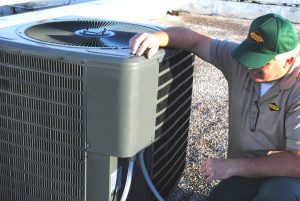
As the temperatures rise, so does the need for an efficient air conditioning system to keep your home cool and comfortable. However, running your AC all day can lead to high energy bills. By following some top tips for energy-efficient AC installation, you can stay cool without breaking the bank.
Choose the Right Size AC Unit
One of the most crucial factors in ensuring energy efficiency is selecting the right size air conditioning unit for your space. Here are some key points to consider:
- Too small of an AC unit will have to work harder to cool your space, leading to higher energy consumption.
- Conversely, too large of a unit will cycle on and off frequently, wasting energy and potentially causing temperature inconsistencies.
- Consult with a professional to calculate the appropriate size of the AC unit based on the square footage of your home.
Opt for High-Efficiency Models
When shopping for a new air conditioning unit, look for models that are ENERGY STAR certified. These units meet strict energy efficiency guidelines set by the U.S. Environmental Protection Agency. Here's why you should opt for high-efficiency models:
- ENERGY STAR certified AC units use up to 20% less energy than standard models, leading to significant cost savings over time.
- These units often come with advanced features such as programmable thermostats and variable speed motors that help optimize energy usage.
- While high-efficiency models may have a higher upfront cost, the long-term energy savings make them a worthwhile investment.
Proper Installation is Key
Even the most energy-efficient AC unit will underperform if it is not installed correctly. Proper installation is crucial to ensure optimal performance and efficiency. Consider the following when installing your air conditioning system:
Seal and Insulate Ductwork
Leaky ducts can result in up to 30% energy loss, reducing the efficiency of your AC system. To prevent this, make sure to seal and insulate your ductwork properly.
- Check for any leaks or gaps in the ductwork and seal them using mastic tape or aerosol sealant.
- Insulate ducts in unconditioned spaces such as the attic or crawl spaces to prevent heat transfer.
Position the Outdoor Unit Correctly
The placement of the outdoor unit can impact its efficiency and longevity. Follow these guidelines when positioning your AC unit:
- Ensure the unit is placed in a shaded area to prevent overheating and reduce the workload on the compressor.
- Keep the outdoor unit clear of debris, plants, and obstructions to allow proper airflow.
- Maintain at least two feet of clearance around the unit for optimal performance.
Maintain Your AC System Regularly
Proper maintenance is essential to keep your air conditioning system running efficiently. Regular tune-ups and inspections can help identify and address issues before they escalate. Here are some maintenance tips to improve energy efficiency:
Change Air Filters
Dirty air filters can restrict airflow, causing your AC system to work harder and consume more energy. Make sure to check and replace your filters regularly to improve efficiency.
- Check filters every one to three months, especially during peak usage seasons.
- Use high-efficiency filters to trap more dust and debris, improving indoor air quality.
Schedule Professional Inspections
Professional HVAC inspections can help identify potential issues and ensure your system is running efficiently. Consider scheduling annual maintenance visits to keep your AC system in top condition.
- A professional technician can clean coils, check refrigerant levels, and inspect ductwork for any leaks or damage.
- Regular maintenance can extend the lifespan of your AC unit and prevent costly repairs down the line.
By following these top tips for energy-efficient AC installation and maintenance, you can stay cool while saving money on your energy bills. Investing in the right AC unit, proper installation, and regular maintenance will not only improve efficiency but also extend the lifespan of your system.
